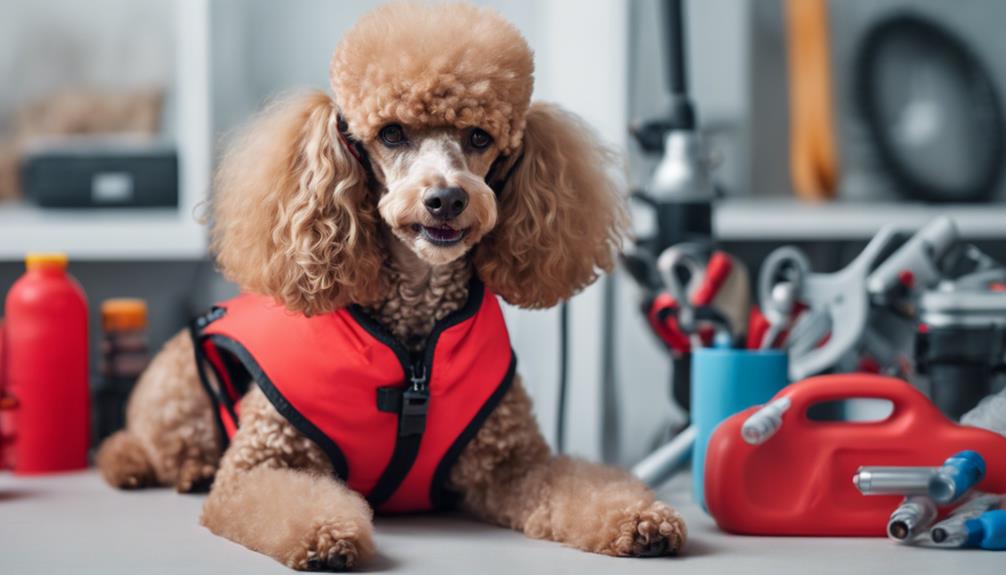Have you ever considered the unique qualities that make Poodles suitable for therapy and service roles? These intelligent and versatile dogs are known for their hypoallergenic coats and innate ability to connect with humans. But what specific training methods are employed to harness their potential in assisting those in need? By exploring the intricacies of preparing Poodles for such vital roles, you can uncover the depth of dedication and skill required to mold them into invaluable companions for individuals who rely on their support.
Key Takeaways
- Poodles excel in therapy and service roles due to their intelligence and gentle demeanor.
- Training for therapy poodles emphasizes emotional support and positive interactions with patients.
- Successful evaluation ensures poodles are suitable for service or therapy roles based on temperament and socialization.
- Specific training aspects focus on obedience, task-specific skills, and public access for service and therapy poodles.
Poodle Characteristics for Service Roles

Poodles demonstrate an exceptional blend of intelligence, hypoallergenic traits, and varied sizes, making them an ideal choice for diverse service roles. Among the different sizes of Poodles, Standard Poodles stand out for their remarkable capabilities in service tasks. Their larger build and strength enable them to assist with physical tasks that other smaller sizes might struggle with. Standard Poodles excel in service roles due to their agility, intelligence, and eagerness to learn, making them highly trainable for a variety of service-oriented activities.
When it comes to therapy work, Standard Poodles shine with their gentle and loving nature. Their affectionate demeanor and intuitive understanding of human emotions make them excellent companions in therapy settings. Standard Poodles have a knack for providing comfort and emotional support to those in need, showcasing their natural ability to connect with individuals on a deeper level. In conclusion, Standard Poodles are not only adept at physical service tasks but also excel in providing emotional support and companionship in therapy roles.
Poodle Characteristics for Therapy Roles
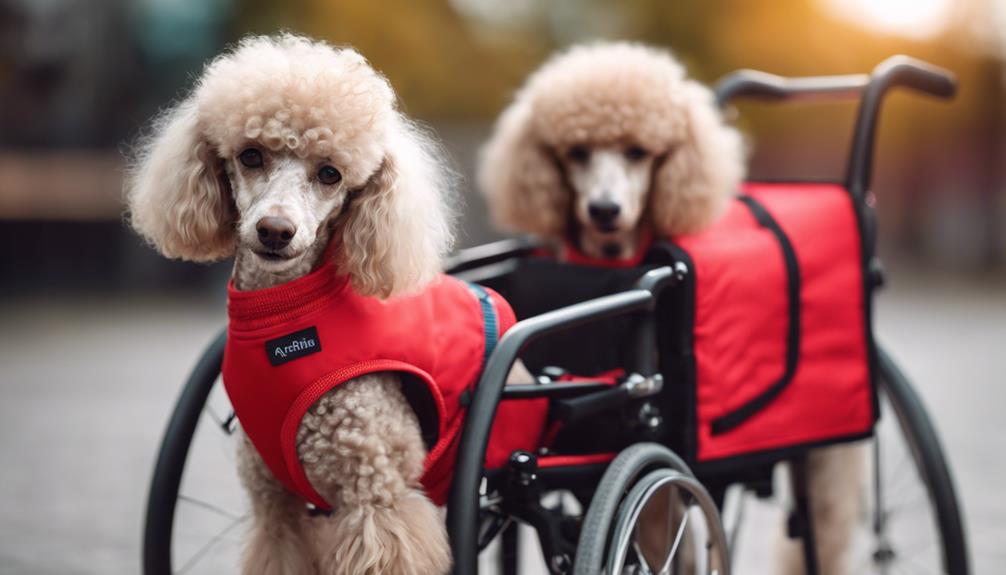
Poodles' gentle temperament, combined with their intelligence and adaptability, make them well-suited for therapy roles. Their ability to learn and perform tasks effectively enhances their potential to provide support and comfort to individuals in need. Poodles' friendly and sociable nature fosters positive interactions with patients, creating a conducive environment for therapy sessions.
Poodle Temperament Traits
With their intelligence, friendly demeanor, and adaptability, Poodles exhibit temperament traits that are highly suited for therapy roles. Poodles' ability to quickly grasp new tasks, combined with their hypoallergenic coat, makes them ideal for therapy work. Their social nature allows them to interact well with individuals in therapy settings, providing comfort and support. Additionally, the adaptability of Poodles enables them to thrive in various environments and adapt to different therapy tasks effectively. Their high energy levels can be positively harnessed during therapy activities, keeping clients engaged and active. Overall, Poodles possess a unique combination of traits that make them well-suited for fulfilling and impactful roles as therapy dogs.
| Temperament Traits | Suitability for Therapy Roles |
|---|---|
| Intelligence | Quick learners for therapy tasks |
| Friendly Demeanor | Ideal for interacting with people |
| Adaptability | Thrive in various therapy environments |
Therapy Task Suitability
When considering therapy task suitability for Poodles, their inherent characteristics play a crucial role in determining their effectiveness in fulfilling therapeutic roles. Poodles, known for their intelligence and hypoallergenic coat, make excellent therapy dogs, emotional support animals, and service dogs. Their non-shedding coat and friendly demeanor enable them to provide comfort and support to individuals in need. Poodles' exceptional obedience training further enhances their ability to perform tasks reliably and precisely, crucial in therapy settings. Their versatility allows them to fulfill various roles, from offering emotional support to providing companionship and assistance. Poodles' capacity to form strong bonds with handlers and display empathy makes them well-suited for therapy work, enriching the human-animal connection in therapeutic environments.
Interaction With Patients
In therapeutic settings, the characteristics of Poodles lend themselves effectively to fostering positive interactions with patients. Poodles' friendly and gentle demeanor creates a comforting atmosphere for patients, promoting relaxation and trust. Their intelligence and trainability enable them to learn specific tasks that assist patients in therapy roles, enhancing the overall therapeutic experience. Additionally, Poodles' hypoallergenic and non-shedding coat make them suitable companions for patients with allergies, ensuring a clean and hygienic environment. Their social nature and ability to form strong bonds allow them to connect deeply with individuals in need, providing emotional support and companionship. Overall, Poodles are well-suited for interaction with patients in therapy roles, bringing joy and comfort to those they serve.
Training Requirements for Service Poodles
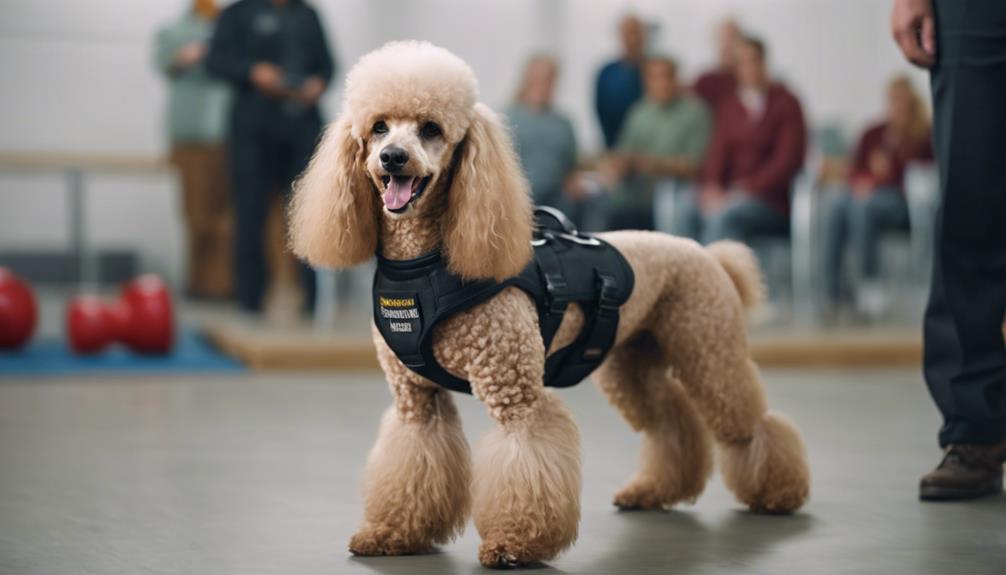
Service Poodles undergo intensive training to master specific skills crucial for assisting individuals with disabilities. Their training includes tasks such as guiding the visually impaired, alerting to medical issues, and providing physical support. To become certified service animals, Poodles must exhibit exceptional obedience, concentration, and reliability in diverse situations.
Service Poodle Training
Mastering essential tasks like opening doors, guiding, and alerting to medical conditions is a key requirement for Service Poodles undergoing specialized training to assist individuals with disabilities. Training Service Poodles for special needs involves honing specific skills to ensure they can provide tailored assistance. Here is a breakdown of the training requirements for Service Poodles:
| Training Component | Description |
|---|---|
| Socialization | Exposure to various environments and people. |
| Obedience Training | Learning commands and responding promptly. |
| Task Training | Mastering specific tasks like alerting to seizures. |
| Confidence Building | Developing self-assurance in various situations. |
| Responsiveness | Being attentive and receptive to handler cues. |
Service Poodles must demonstrate these qualities to excel in their role of supporting individuals with disabilities effectively.
Skills and Commands
To excel in their role of supporting individuals with disabilities effectively, Service Poodles must undergo training to master specific skills and commands tailored to their tasks. Training for Service Poodles is crucial as it equips them with the abilities needed to assist their handlers in various situations. Commands like 'retrieve,' 'alert,' and 'guide' are essential for Service Poodles to fulfill their duties. They need to be proficient in tasks such as retrieving objects and indicating medical issues. Moreover, Service Poodles must learn to respond promptly and accurately to cues and commands from their handlers. By receiving specialized training focused on enhancing their support capabilities, Service Poodles can provide invaluable assistance in both emergencies and daily activities for individuals with disabilities.
Certification Process
The certification process for Service Poodles entails rigorous training in specialized tasks tailored to assist individuals with disabilities in their daily lives. Service dog training focuses on developing skills that cater to the specific needs of their handlers. Tasks include:
- Guiding the visually impaired.
- Alerting to medical conditions.
- Providing mobility support.
- Retrieving objects, opening doors, and offering emotional support.
Individually trained service poodles must demonstrate high levels of obedience, reliability, and responsiveness to commands during their certification process. This thorough training ensures that service poodles are well-equipped to handle various situations and environments while effectively supporting individuals with disabilities.
Training Requirements for Therapy Poodles
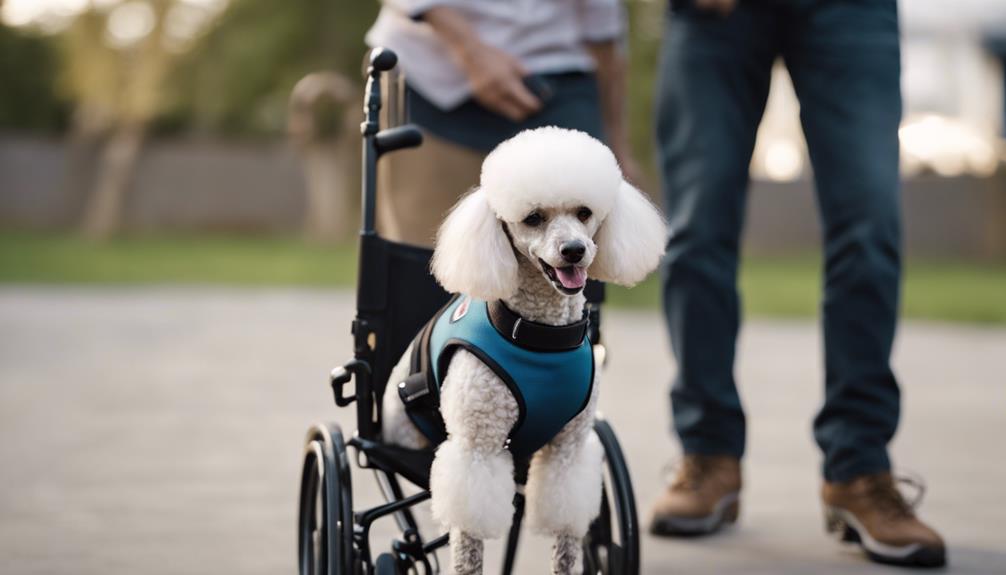
For successful therapy poodle training, passing a therapy-specific test or the AKC Canine Good Citizen test is essential. Therapy Poodles must exhibit a calm, friendly, and affectionate demeanor towards strangers, making social interaction a key component of their training. In addition to basic obedience skills, regular health check-ups, grooming, and adaptability to new environments are crucial for their role in therapy. Below is a breakdown of the training requirements for Therapy Poodles:
| Training Requirements | Description |
|---|---|
| Pass Therapy-Specific Test | Demonstrate ability to interact calmly and positively with strangers in various environments. |
| AKC Canine Good Citizen Test | Showcase good manners, obedience, and temperament in different everyday situations. |
| Regular Health Check-ups | Ensure overall well-being and fitness to engage in therapy activities. |
Training Therapy Poodles involves a holistic approach that emphasizes both their behavior and physical well-being, preparing them to serve effectively in therapy roles.
Socialization Techniques for Service Poodles

Implementing effective socialization techniques is vital for shaping service poodles' behavior and temperament to excel in their designated roles. When socializing service poodles, consider the following:
- Exposure to Various Environments: Introduce service poodles to a range of environments, both indoor and outdoor, to help them adapt to different settings they may encounter during their service duties.
- Interaction with Diverse Stimuli: Expose service poodles to various sounds, people, and animals during socialization to ensure they remain calm and focused amidst distractions in their service roles.
- Positive Encounters with People: Encourage positive interactions with individuals of different ages, backgrounds, and abilities to foster a friendly and approachable demeanor in service poodles.
- Building Confidence: Through proper socialization, instill confidence in service poodles, helping them navigate challenging situations with ease and grace, a crucial attribute for their success as service animals.
Socialization Techniques for Therapy Poodles
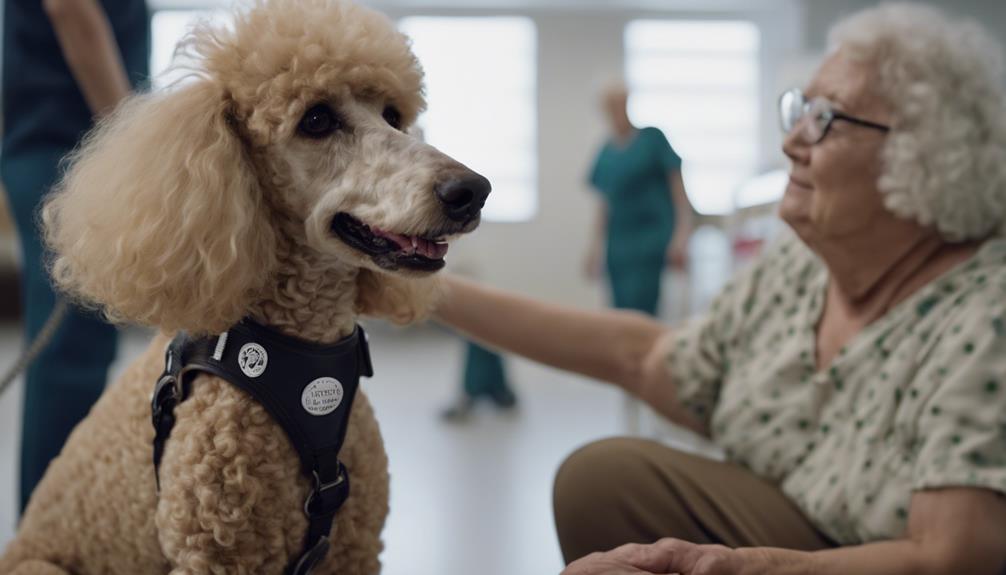
To prepare therapy poodles for their roles, ensuring positive interactions with strangers and exposing them to various environments are essential. These experiences help therapy poodles develop social skills and adaptability, crucial for their work as therapy animals. Introducing them to different textures, surfaces, and situations from a young age fosters confidence and helps them remain calm and focused in diverse settings.
Positive Interactions With Strangers
Utilize varied socialization techniques to expose therapy poodles to diverse environments, people, and situations, fostering positive interactions with strangers crucial for their confidence and adaptability. When focusing on positive interactions with strangers, consider the following key points:
- Building Trust: Encourage therapy poodles to approach strangers calmly and friendly, establishing a foundation of trust.
- Confidence Boost: Positive encounters with strangers help boost the confidence of therapy poodles in unfamiliar settings.
- Enhancing Companionship: By fostering positive interactions, therapy poodles can excel in their role as comforting companions during therapy sessions.
- Adaptability: Proper socialization aids therapy poodles in adapting to a variety of individuals they may encounter, ensuring they can provide support effectively.
Exposure to Different Environments
How can exposure to different environments benefit therapy poodles in their socialization journey? Socialization plays a crucial role in preparing therapy poodles for their service roles by introducing them to a variety of environments, including hospitals, schools, nursing homes, and public spaces. By familiarizing therapy poodles with different sounds, smells, sights, and textures, they become more comfortable and confident in diverse settings. This exposure helps them develop the adaptability, calm demeanor, and focus required to interact with various individuals effectively. Furthermore, being accustomed to different environments enables therapy poodles to navigate unexpected situations and distractions with composure, allowing them to concentrate on their therapy tasks. Ultimately, well-socialized therapy poodles are better equipped to provide comfort, support, and companionship to those in need across a range of environments and situations.
Obedience Training for Service Poodles
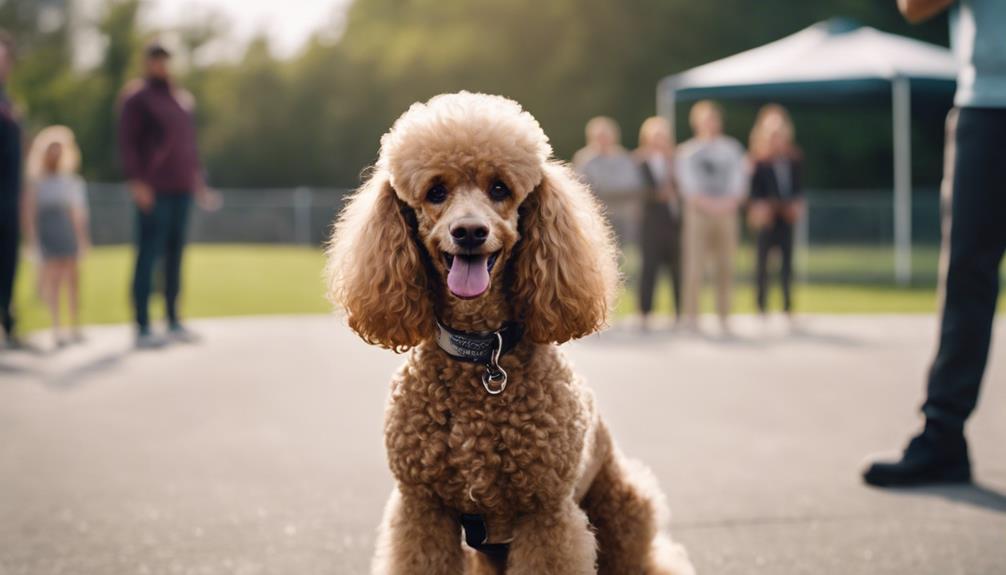
Obedience training for service poodles plays a crucial role in shaping their ability to perform specialized tasks effectively and support individuals in need. When training these remarkable service dogs, here are four key aspects to focus on:
- Teaching Specific Tasks: Service poodle training concentrates on instructing tasks such as guiding the blind or alerting to seizures, tailored to the individual needs of their handlers.
- Specialized Training for Emergencies: Service poodles undergo specialized training to assist in emergencies, requiring them to stay calm and responsive in high-stress situations.
- Assisting with Mobility and Support: Tasks like opening doors, providing mobility support, and calling for help are essential skills service poodles must master to aid their handlers effectively.
- Early Age Training and Breed Traits: Emphasizing early age training and leveraging breed-specific traits suited for service work ensures service poodles develop the necessary confidence and responsiveness for their obedience training regimen.
Obedience Training for Therapy Poodles

Transitioning from the specialized obedience training required for service poodles, therapy poodles undergo a more foundational approach focusing on teaching essential commands and behaviors. Basic obedience training is key for therapy dogs, with a strong emphasis on commands like sit, stay, and come. Positive reinforcement techniques are utilized to cultivate desired behaviors in therapy poodles, ensuring they respond well to instructions during therapy sessions. Socialization exercises are vital for therapy poodles to acclimate to diverse environments and people, enhancing their ability to provide comfort and support effectively. Consistent training routines play a crucial role in shaping good behavior and manners in therapy poodles, preparing them for their roles in assisting individuals in need. Moreover, well-groomed and healthy therapy poodles are better equipped to engage in obedience training and interact with individuals during therapy sessions, fostering a positive and impactful experience for both the dog and the recipients of therapy.
Task-Specific Training for Service Poodles
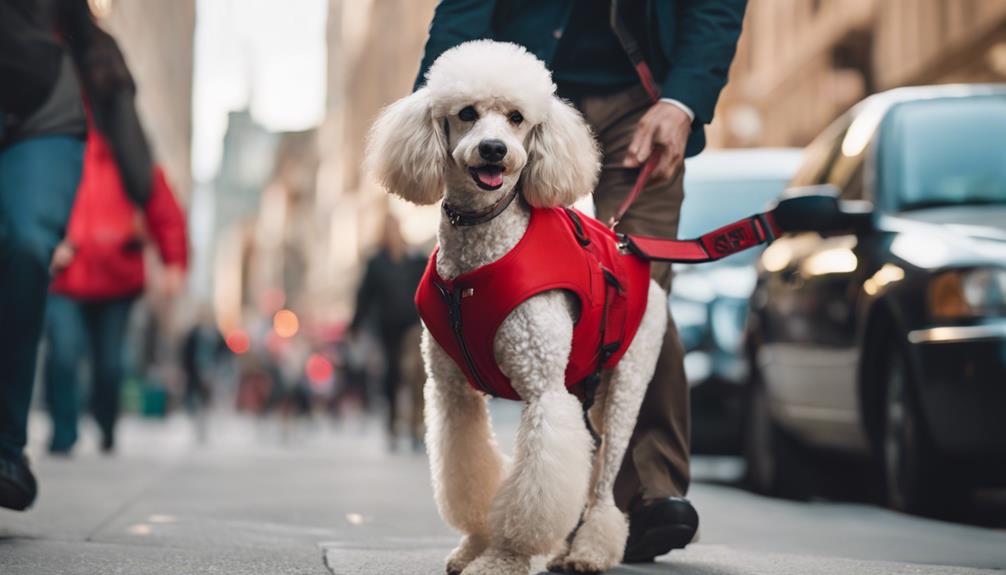
In preparing service poodles for their roles, specialized task-specific training is essential to equip them with the skills needed to assist individuals with disabilities effectively. Here are four key aspects of task-specific training for service poodles:
- Specialized Tasks: Service poodles are taught to perform specific tasks such as opening doors, retrieving items, and alerting to medical conditions.
- Tailored Assistance: Training is customized to meet the unique needs of the handlers, ensuring that the poodles can provide assistance in ways that support their independence and quality of life.
- Response to Cues: Service poodles learn to respond to distinct cues and signals, enabling them to assist in various situations based on the handlers' requirements.
- Reliability and Capability: Through rigorous training, service poodles develop reliability, responsiveness, and the ability to support handlers effectively in daily activities and emergencies.
Task-specific training plays a crucial role in preparing service poodles to assist individuals with disabilities, enhancing their capacity to serve and make a positive impact on the lives of those in need.
Task-Specific Training for Therapy Poodles
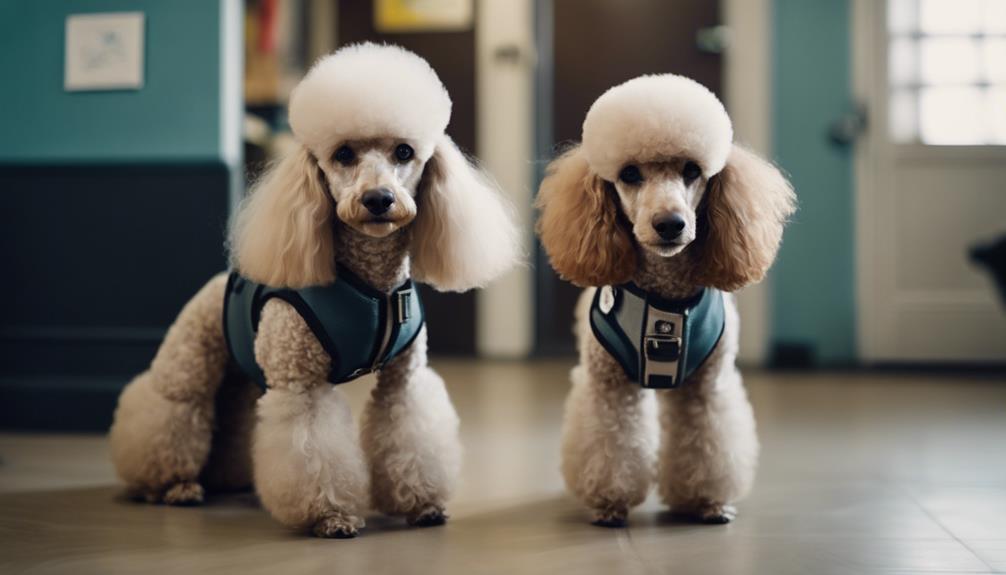
Task-specific training equips therapy poodles with the necessary skills to provide comfort and support effectively to individuals in need. This specialized training focuses on honing abilities such as offering emotional support, maintaining a calming presence, and engaging in gentle interactions tailored for therapy roles. By responding to cues, facilitating bonding, and adapting to diverse environments during therapy sessions, therapy poodles can meet specific therapeutic objectives and engage with various populations effectively. Through task-specific training, these poodles are prepared to positively impact the emotional well-being of those they interact with. This training ensures that therapy poodles can create a safe and supportive environment, fostering connections with individuals seeking emotional comfort. Their ability to provide tailored emotional support and maintain a calming presence showcases the importance of task-specific training in preparing therapy poodles for their vital role in enhancing the well-being of others.
Public Access Training for Service Poodles
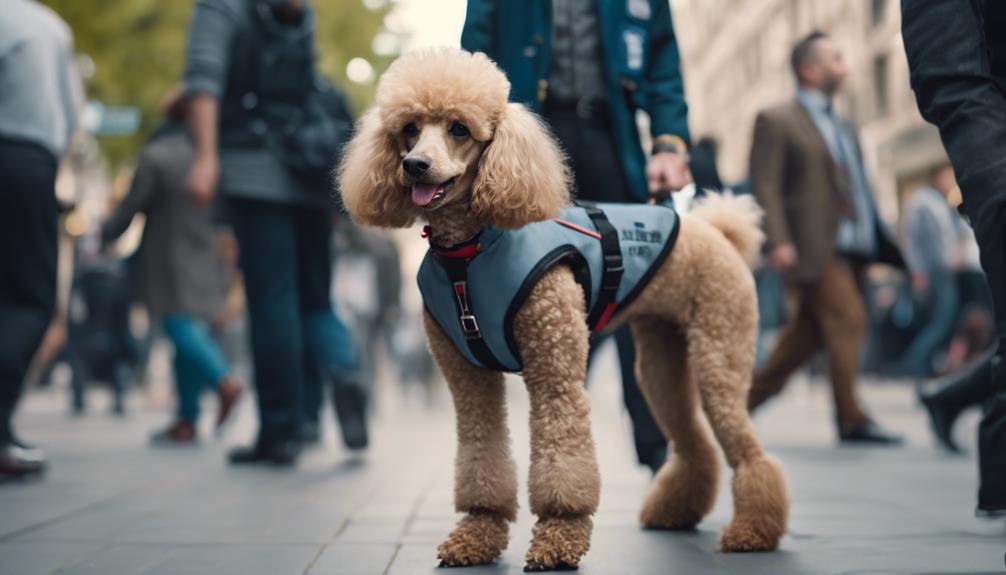
Public Access Training equips service poodles with the necessary skills to behave appropriately in various public settings, ensuring they can assist their handlers effectively. During this training, service poodles are taught to remain calm and focused amidst distractions, enabling them to carry out their tasks reliably. Here's what public access training for service poodles entails:
- Behavior in Public Settings: Service poodles learn to ignore distractions and follow commands while maintaining good behavior in different environments.
- Focus and Calmness: Training includes exposure to various situations to help service poodles stay focused and composed when assisting their handlers.
- Task Reliability: By teaching service poodles to handle distractions, the training aims to ensure they can perform their tasks consistently and accurately.
- Seamless Public Accompaniment: The ultimate goal is to prepare service poodles to accompany their handlers in public places smoothly, enhancing the efficiency of their assistance.
Through public access training, service poodles develop the necessary skills to navigate public spaces adeptly, supporting their handlers effectively.
Public Access Training for Therapy Poodles
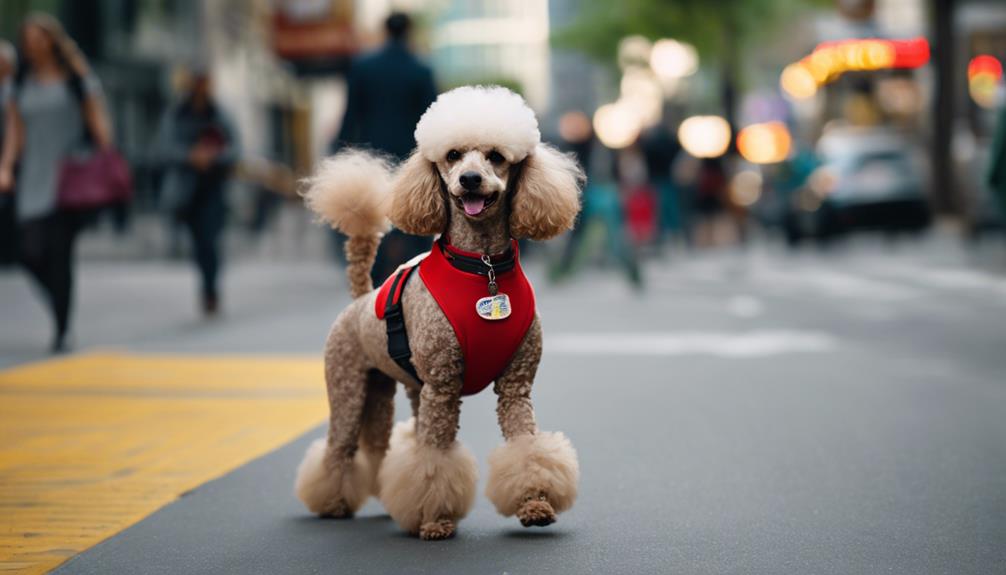
With a focus on behavioral refinement and social adaptability, therapy poodles undergo public access training to excel in diverse public environments. This specialized training is crucial for therapy poodles as it aims to instill in them the ability to remain composed and well-mannered in a variety of public settings. Socialization plays a key role in this training, ensuring that therapy poodles are at ease and confident when interacting with different people, navigating various environments, and dealing with distractions. Exposure to busy places, loud noises, and other animals is incorporated into their training regimen to prepare them for the challenges they may encounter while on duty. Public access training also emphasizes obedience, good manners, and appropriate behavior to equip therapy poodles with the skills needed to work effectively in public spaces. Ultimately, the goal of public access training is to enable therapy poodles to accompany their handlers in hospitals, nursing homes, schools, and other therapy settings with ease, professionalism, and grace.
Evaluating Poodles for Service and Therapy
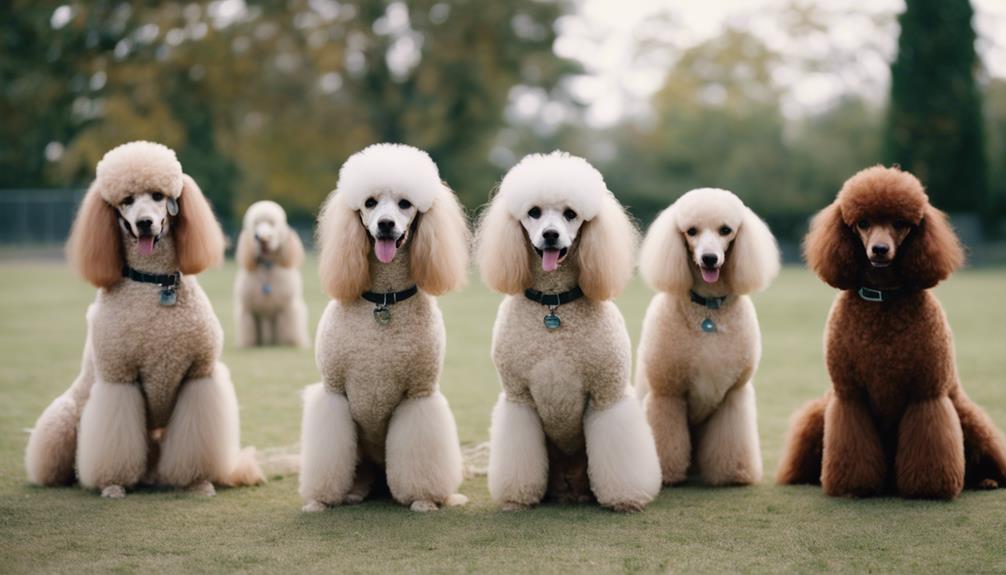
To thoroughly assess poodles for service and therapy roles, their temperament, trainability, and level of socialization are key factors considered in the evaluation process. Evaluating poodles for these roles involves observing their reactions to new environments, assessing their ability to focus and respond to commands, gauging their comfort with strangers, and evaluating their adaptability to different situations. Poodles selected for service or therapy work undergo specialized training tailored to their specific roles and tasks. Successful evaluation ensures that poodles are well-suited to provide support, comfort, and assistance as service animals in various settings. These assessments are crucial in determining which poodles are best suited to be trained to assist individuals in need. A poodle's temperament plays a significant role in its suitability for service work, as it needs to be calm, patient, and adaptable. Assessing a poodle's trainability helps in understanding how effectively it can learn and perform the required tasks. Lastly, evaluating a poodle's socialization level aids in predicting its interactions with diverse groups of people in different environments.
Frequently Asked Questions
Can a Poodle Be Trained as a Service Dog?
Yes, a poodle can be trained as a service dog. Their temperament, intelligence, and obedience make them ideal for service dog tasks like guiding the visually impaired. Training techniques focus on reinforcing desired behaviors through positive reinforcement and consistency.
What Is the Best Poodle Mix for a Service Dog?
When choosing a Poodle mix for service work, consider Labradoodles for their gentle nature, Goldendoodles for their friendliness, and Bernedoodles for their versatility. Training these mixes with positive reinforcement techniques can enhance their service capabilities.
Can a Service Dog Be Trained for Anxiety and Depression?
Yes, service dogs can be trained to provide emotional support for anxiety and depression. Training methods focus on sensing changes in behavior, offering companionship, and teaching grounding techniques. Dogs can assist with tasks to alleviate symptoms.
Why Are Poodles Good Therapy Dogs?
Poodles make good therapy dogs due to their gentle temperament, intelligence, and ability to provide emotional support and companionship. Their natural affinity for bonding and trust building ensures they excel in comforting those in need.
Conclusion
In conclusion, training Poodles for therapy and service roles requires dedication, specialized skills, and ongoing support. One example of a successful therapy Poodle is Bella, who brings comfort and joy to patients in a local hospital. Through proper training and socialization, Poodles like Bella can make a significant impact on the lives of those in need. With continued efforts and personalized approaches, these intelligent and compassionate dogs can excel in their roles, providing invaluable support to individuals.
